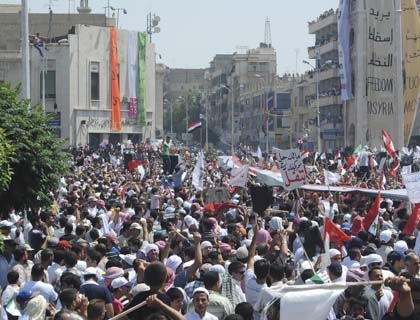A month-long mandate of Arab monitoring team expired lately this week and its chief Mr. Mohammad al-Dabi is still working on the report to represent to League's leaders likely within few coming days. The team was deployed to the country last month in the wake of suspension of Syria's membership in the League. The suspension came after members blamed Damascus of not realizing its promises and commitments on the basis of November agreement among members aimed to stop violence and bloodshed which according to UN Security Council report last month left more than five thousand dead.
On the basis of bilateral agreements between Syria and the rest members, the government had to pull back troops, armored vehicles and release all political prisoners.
But, seemingly, one thing remained vague and ambiguous: the deadline was not clearly verified when exactly the regime should put its articles into practice. While few days later, Syrian membership was suspended on the basis of not practicing its commitment, the step followed by Damascus with severe criticism.
Mr. President Assad lambasted his counterparts, arguing they have not given enough time to implement the context of the agreement. But after several arguments, Damascus allowed monitoring team to check out whether the regime has remained committed to its promises or not. Reportedly, simultaneous to the arrival of monitoring team, violence and bloodshed decreased relatively.
Meanwhile, there were reports and videos released on webs showing inconvenience of oppositions. Protestors were telling that Arab monitors are in the control of security forces and they were not free to visit areas that were said to be the flashpoints of conflict.
It is not known yet in his reports what Mr. Mohammad al-Dabi will focus on, but it is largely expected that report will not approve the allegations of Damascus of practicing the context of November bilateral agreement.
The question lies here? What would be the next step of Arab League in the case Syria be recognized guilty by members. It is really hard to answer as the situation in Syria is getting worse.
According to reports, since the arrival of monitoring team last month, around six hundred people were killed, raising the average in comparison to past months. And due to severe clashes of army defectors and regime loyalists a city has fallen to hands of rebellions.
The regime will try its most to recapture the city of Zabadan to eliminate any chance of Libyan-like military intervention. However, currently both sites live in ceasefire. But it is clear the violence would erupt soon. It looks quite hard for the regime to tolerate a parallel force which definitely will change into a tough anti-government front.
On the other hand, oppositions will also resist strongly and may not give up easily as they paid high price for a location completely out of government authority. Because it is largely maintained that if they attract the global attention, particularly, after the possible Arab initiative failure—as one of the members to monitoring team has said that the mission was a "farce"—they can increasingly recruit more and challenge the regime.
Coming back to the question about the next step of Arab League I would say that it had already suspended Syrian membership and impose sanctions along with international community. What else it can do?
Definitely, tightening sanction would be on the table. However, it is clear that the pressure is an appreciating mean but with least success.
Some countries are even disappointed of possible change in regime's behavior through ratcheting up pressure. Qatar has openly called for military intervention to end violence and stop bloodshed, but seemingly, it is not prescribed by all members or even western countries on the other hand, some others have lost optimism about possible regime change and try to keep an option open ahead in the case government survives the ongoing crises.
The anger of Turkey ostensibly has subsided as the unilateral sanction hurt the country far larger than Syria. So, sealing the border with Damascus indeed means closing its own way to fruitful Arab market, the decision that Ankara took, but there are reports about tumultuous situation at the border by citizens whose subsistence is based on border flows.
The second option is referring the case to UN Security Council. None of the members has remarkable position in the council and, thus, cannot bring fundamental change to current differences within the members. But referring the case to UN Security Council indeed complicates the situation for Bashar al-Assad regime. The step means that an Arabic solution did not work as many of the so-called Pro-Damascus counted on. And they will stand steadily aligned with countries demanding tougher resolution.
In such situation, the countries opposing tougher sanctions will be pressurized and they perhaps grudgingly approve anti-regime measures because they cannot close their eyes on deadly crackdown in the country.
The third measure is the possible military intervention.
The international community has sharp differences and yet a tough resolution has not been passed through the United Nations' Security Council. Presently, both Europe and North America have their own domestic and foreign problems. The economic situation has turned worse as the Euro countries remained unable to deal with sovereign debts. Meanwhile, they try to impose sanctions on Iran and ban oil imports. It means they should be prepared for market reaction. .
In such a situation, it looks far likely that they add problems to existing ones.
What will we observe in the next coming weeks, in the most possible optimistic situation, would be reference of the case to UN Security Council by the League.

